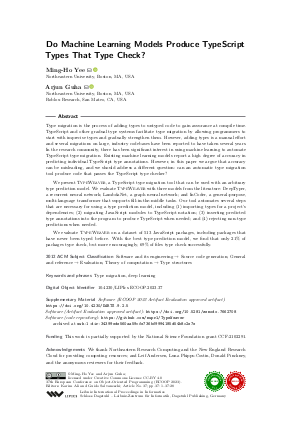@InProceedings{yee_et_al:LIPIcs.ECOOP.2023.37,
author = {Yee, Ming-Ho and Guha, Arjun},
title = {{Do Machine Learning Models Produce TypeScript Types That Type Check?}},
booktitle = {37th European Conference on Object-Oriented Programming (ECOOP 2023)},
pages = {37:1--37:28},
series = {Leibniz International Proceedings in Informatics (LIPIcs)},
ISBN = {978-3-95977-281-5},
ISSN = {1868-8969},
year = {2023},
volume = {263},
editor = {Ali, Karim and Salvaneschi, Guido},
publisher = {Schloss Dagstuhl -- Leibniz-Zentrum f{\"u}r Informatik},
address = {Dagstuhl, Germany},
URL = {https://drops.dagstuhl.de/entities/document/10.4230/LIPIcs.ECOOP.2023.37},
URN = {urn:nbn:de:0030-drops-182307},
doi = {10.4230/LIPIcs.ECOOP.2023.37},
annote = {Keywords: Type migration, deep learning}
}

 Creative Commons Attribution 4.0 International license
Creative Commons Attribution 4.0 International license
